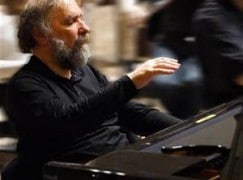Radu Lupu is all the greater since he gave up recording
mainThe Romanian pianist, who turned 70 yesterday, has observed media silence for more than 20 years.
Kirill Gerstein, in a review for New York Review of Books, argues the decision has added an extra dimension to his performances:
For the past two decades, the Romanian pianist Radu Lupu has chosen not to record any music. He does not allow radio broadcasts of his playing, he does not give press interviews, and he has almost no social media presence. This had made his performances all the more prized. Lupu, who turns seventy on November 30, is far more than a great pianist; listening to him, my attention slips away from the beauty and mastery of his piano playing, deeply impressive though it is, with a rich palette of sound and resonance, control over chordal voicing fueled by an exceptionally refined harmonic sense, and a muscular apparatus that accurately plots into reality his imagination of the shape and timing of musical events. Soon, I find I am taken deep below and far above the surface.

Read Kirill’s full review here.





Comments